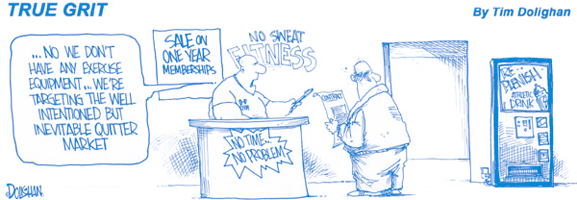Last week, I started a discussion about the prospects of positive thinking alone being a pathway to success. When researched in an objective manner, this philosophy has been shown to produce less-than-positive results.
Don’t get me wrong—there is nothing harmful about being optimistic and having positive thoughts. However, there seems to be a line that is crossed by some people where positive thoughts become a strategy. Under the scrutiny of objective research, this philosophy appears to be flawed and unreliable.
As much as researchers have been critical of positive thinking success strategies, they have become excited about the concept of “grit.” Grit is a success strategy that does withstand the rigors of research.

If you’re a long-time WorkPuzzle reader, you’ll probably remember this topic. Dave and I have both written about it several times over the last five years.
For those of you who may be new readers, I’m going republish parts of two blogs (1, 2) Dave wrote in 2009. Even if you’ve read these blogs already, it is a good reminder on how success is truly achieved.
Angela Lee Duckworth, PhD, has conducted a series of studies on a concept called "grit."
Grit is another word for backbone, chutzpah, fortitude, guts, stick-to-it-iveness, etc.
It all started when Dr. Duckworth observed that it wasn't necessarily the smartest people who succeeded and made a lasting impact on science. She had a hunch that it was a person's personal "grit" recipe that made the difference in their level of success.
Across six studies, Duckworth found that grit significantly contributed to successful outcomes: Undergrads with the most grit earned higher grade point averages than their peers. West Point Cadets with the highest levels of grit were more likely to return after the first summer. Even "grittier" spelling bee competitors (a situation where IQ would seem the best predictor) out-spelled their less tenacious competitors. Among older individuals, people with substantial grit had higher levels of education and made fewer career changes than less gritty peers of the same age.
Many successful people don't attribute their success to their IQ or level of talent [or positive thoughts], but rather to their tenacity. Thomas Edison was one of those people. Edison once said:
"Many of life's failures are people who did not realize how close they were to success when they gave up.”
Here is another prime example of grit: Poet David Baker is Director of Creative Writing at Denison University, and author of seven books of poetry, including "Midwest Eclogue." Mr. Baker laments:
"Unfortunately, no one comes in my window and whispers poems to me... Poets [have to] work hard. I may work on a single poem for weeks or months and write 60 or 70 drafts—only to decide that draft 22 was the good one.”
Along these same lines, people often refer to Mozart's diaries, where he divulges that an entire symphony appeared, supposedly intact, in his head. However, Jonathan Plucker an educational psychologist at Indiana University points out:
"But no one ever quotes the next paragraph, where he talks about how he refined the work for months.”
So, if you review the research I referenced in the last blog… you’ll see that grit appears to the vital component to success.
Success comes to those who work harder and demonstrate perseverance in the face of obstacles.
"When you get into a tight place and everything goes against you, till it seems as though you could not hang on a minute longer, never give up then, for that is just the place and time that the tide will turn." (Harriet Beecher Stowe)
Where does that leave the positive thinker?
Not as far from the truth as you might imagine. Having positive thoughts is a great start, but it must be combined with hard work, tenacity, and focus on doing whatever it takes to accomplish the goal.
This is grit. It’s far beyond positive thinking, and it’s what effective people do to be successful.
Join the WorkPuzzle Discussion at the Tidemark Online Community (TMOC)
Engage in the WorkPuzzle discussion by joining the TMOC private social network. Commenting on a public blog like WorkPuzzle can be a little intimidating, so why not join the discussion inside the privacy of the TMOC discussion group?
By joining TMOC, you'll get to see who else is in the group and your comments will only be seen by those whom you trust. Joining TMOC is quick, easy, and free (no kidding…this takes less than 2 minutes). To get started, click here.
Already of a member of TMOC? If so, join the WorkPuzzle Dialog Group by clicking on the WorkPuzzle Group icon on the left side of your TMOC homepage. Questions? Email the WorkPuzzle editor (workpuzzle@hiringcenter.net) and we'll walk through the process.
 Editor's Note: This article was written by Ben Hess. Ben is the Founding Partner and Managing Director of Tidemark, Inc. and a regular contributor to WorkPuzzle.
Editor's Note: This article was written by Ben Hess. Ben is the Founding Partner and Managing Director of Tidemark, Inc. and a regular contributor to WorkPuzzle.




Comments